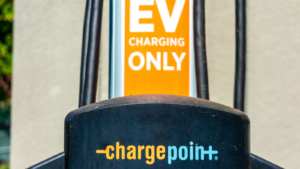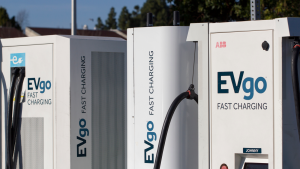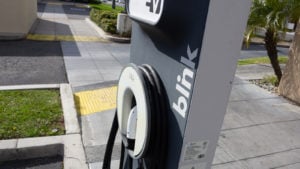
American car buyers are losing interest in EVs mainly due to a need for charging infrastructure. According to a recent J.D. Power study, fewer consumers are eyeing EVs for the first time since 2021. Moreover, those not interested in buying EVs cited insufficient charging stations as their main concern. Hence, this trend sheds light on the importance of EV charging infrastructure, making EV charging stocks remarkably lucrative over time.
To be fair, if the U.S. wants to follow through on its lofty EV goals, it needs a ton of more EV charging stations. For 50% of all vehicle sales to be electric by 2030, the U.S. would need 30.2 million public and private charging stations. Blink Charging (NASDAQ:BLNK) emphasized that these estimates are 20 times the number of U.S. charging stations in 2023. Hence, the potential for EV charging stocks is massive, offering a marvelous growth runway ahead. Here are the three EV charging stocks to buy:
EV Charging Stocks to Buy: ChargePoint (CHPT)

ChargePoint (NYSE:CHPT) has the distinction of having the largest EV charging network in the U.S. It’s an accolade built on years of robust and consistent top-line expansion, positioning it as one of the sector bellwethers. However, the recent EV demand slowdown has weighed down results in the past couple of years. Seeking Alpha analysts expect CHPT to post $548.4 million this year, representing just 8.3% growth on a year-over-year (YOY) basis. These figures are a bitter pill for investors, especially given ChargePoint’s impressive 5-year average revenue growth of 53%.
Nevertheless, there are plenty of reasons to invest in CHPT, especially when it’s trading 81% behind its 52-week highs. Firstly, it has no debt maturities until 2028 and a healthy $150 million in undrawn revolving credit facility, providing a strong financial cushion.
Furthermore, it offers competitive prices compared to other top players like Electrify America, potentially attracting more subscribers. Speaking of subscribers, CHPT’s recent results, despite the headwinds, show a healthy increase in annual subscription sales.
EVgo (EVGO)

EVgo (NASDAQ:EVGO) is another leading U.S.-based EV charging solutions provider. Like CHPT, the company has been growing at a breathtaking pace over the past five years, delivering triple-digit growth in sales. However, unlike CHPT, it continues to grow rapidly, evidenced by the record $55.2 million in sales in the first quarter (Q1), representing a 118% jump on a YOY basis. Moreover, it added a healthy 109,000 new customer accounts in Q1, a 63% jump YOY. Additionally, gross margins shot up to 12.4% of revenues 0.2% in the same period last year.
The contrast in results from CHPT has a lot to do with the success of its white-label service, eXtend. This unique service differentiates itself from other EV charging providers by installing, operating, and maintaining charging stations for third parties. Hence, it allows the company to expand its reach and sales streams beyond its proprietary network.
Following its strong Q1 showing, EVgo expects to break even on an EBITDA basis by 2025. Moreover, in a high-interest rate environment with significant barriers to entry for smaller EV players, EVgo is poised to continue enhancing its profitability as industry conditions improve.
Blink Charging (BLNK)

Blink Charging stands tall in the EV charging arena, alongside ChargePoint and EVgo, driving the U.S. EV infrastructure revolution. Moreover, similar to its peers, it operates a hyper-growth business but remains a flop in the stock market. Putting things in perspective, it was trading 94% behind its all-time high price of $60.72 in January 2021.
Nevertheless, Blink continues to post robust operational results. It comfortably surpassed analyst estimates across both lines in the past few quarters. Most recently, in its first quarter (Q1), it posted an EPS loss of 13 cents, beating estimates by seven cents. The handy beat has much to do with the 18% drop in operating expenses to $29.2 million. Additionally, revenues of $37.57 million were up 73.1% on a YOY basis, beating estimates by $2.96 million.
As we advance, it expects to post somewhere between $165 million to $175 million in sales, compared to market expectations of $170.5 million. On top of that, it reiterated its target of being profitable on an adjusted EBITDA basis at the end of the year. Another major positive for the company was that it secured a contract to become an official EV charging provider for the state of New York. New York’s EV market has been rapidly growing, with the state aiming to have 2-3 million EVs on the road by 2030 and 10 million by 2050.
On the date of publication, Muslim Farooque did not have (either directly or indirectly) any positions in the securities mentioned in this article. The opinions expressed in this article are those of the writer, subject to the InvestorPlace.com Publishing Guidelines.




